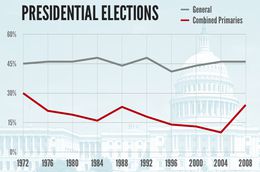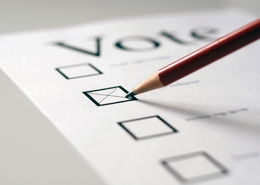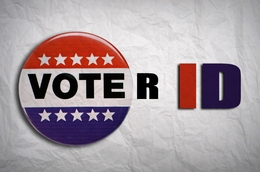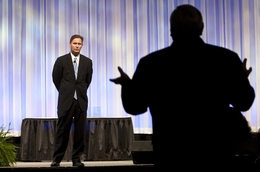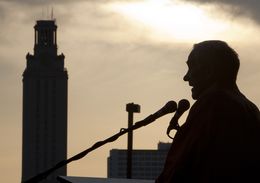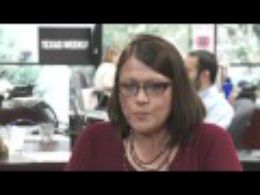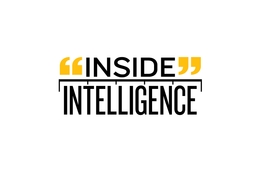This week, we asked the insiders to weigh in on issues and outside influences on the party primaries, about early voting and about making it easier to vote.
The economy leads the list of issues that will determine the May 29 outcomes, according to the insiders, followed by state education spending, taxes, party affiliation, social issues and the state budget. A mix, in other words. But the top two issues outpaced everything else on the list.
The biggest third-party influences on the elections, the respondents said, will be Tea Party activists, Texans for Lawsuit Reform, and wealthy donors. It's apparent from that lineup that the insiders are thinking a lot about the Republicans on the ballot, and not so much about the Democrats.
The votes were all over the place when we asked what percentage of Texans will vote early instead of waiting for May 29; most think it will be less than half of the vote, while 44 percent think early voting will account for half or more than half of the vote.
Finally, we asked whether the state should allow online voting or some other way to make voting easier in an effort to increase participation. The insiders split right down the middle, with 47 percent saying yes and 48 percent saying no.
As always, we've attached the full set of verbatim comments to our questions. Here's a sampling:

.
What issues will be most influential in the Texas primaries?
• "I would add Speaker vote and us citizenship to the issue list."
• "Pocketbooks and checkbooks still rule at the ballot box."
• "Immigration related issues"
• "It's still the economy, Stupid. And all issues start and end with the state budget."
• "State education spending will be front and center. It will be a keystone issue for the next election cycle. The groundwork has begun."
• "It's a presidential year. The state elections will be even more nationalized than usual."
• "Spending spending spending, remember the old quote about it being the economy, well in this case it is the spending stupid!!!!!!!!"
• "'It's the economy, stupid'. But since we're stupid, social issues will matter too."
• "Republicans who voted for Joe Straus for Speaker"

.
That third parties will be most influential in the primaries?
• "Toxic mix of Big Bidness/cartels w/keep conservatism weird movement on localized basis; again, only matters in R primary"
• "Tea Party: They are mad and they vote. It's not just a bumper sticker on their car (like so many of the other groups). They actually are and actually do."
• "Statewide, it will be wealthy donors and various groups, like TLR and TTLA. Locally, it will be hard core partisans, like tea party folks, fiscal conservatives, and uber-liberals."
• "Tea who? Are those people still around? Give it up to the social and fiscal conservatives, as they'll push anything 'anti' this primary season; anti-Obama, anti-establishment, anti-incumbent, anti-federal spending, anti-women's health, anti-minority, anti-public education. Did I leave something out?"
• "Angry public school parents, upper middle class white moms"
• "The legislature is a wholly owned subsidiary of TLR now. How do I know? I found the receipt at the Ethics Commission."
• "Light turnout will favor those with money to get their votes out."
• "The two party system in Texas has become The Tort Reform Party and The Trial Lawyer Party. Everything else are just holdovers from a forgotten era."

.
What percentage of voters will vote early?
• "Will likely be record early turnout due to end of school activities and Memorial Day holiday all around this years election day."
• "It's the overall turnout rate that will be most depressing."
• "Because of the redistricting battle pushing back the primary election, I think most people think the election has come and gone."
• "The collapse of the presidential contest will suppress the vote. Many campaigns are actively pushing voters to vote early. The net effect for many parts of the state may well be > 50 % early voting (Although maybe not to that level in DFW which has several hotly contested seats)."
• "Because of the timing of the election--the Tuesday after Memorial Day--any smart campaign is trying hard to turn out its votes in the early voting period. This, coupled with lower turnout, will drive up the early voting percentage."

.
Should the state develop online voting or some other way to make voting convenient, to increase turnout?
• "Technology doesn't impact apathy. There's no app for that, it's not a matter of convenience. We have early voting. Mobile voting. GOTV efforts. The numbers are always relatively the same."
• "Let's see . . . you have two weeks prior to Election Day. Don't need to bring anything other than a card . . . or just say that's who you are to get a ballot. You can vote by mail. Make it easier? Really?"
• "Our turnout rates are embarrassing, benefiting only incumbents and those who fund/control them. Weekend elections, same-day registration, and vote-by-mail are all options that should be seriously explored. However, the Republican powers that be do not want to run the risk of the hard-working brown masses actually exercising their franchise."
• "The state ought to allow registration/voting on the same day in primaries and general elections (early voting/election day). We're in the 21st Century and I don't know why one needs to register one month before an election just to vote."
• "The state needs to first secure 'offline' voting before they even THINK about developing online voting."
• "Early voting is bad for democracy - it makes campaigns more expensive and uncertain without increasing turnout. I would mandate voting centers, so that a voter could vote anywhere in the county, as we do in early voting already, and restrict early voting to mail-in absentee with an excuse, as in the old days."
• "If mail in ballots and early voting locations are not enough what is, people are just lazy. If you cannot take a few minutes to vote but will plant your butt at a ball game for hours then please...."
• "The worst thing for this state would be for all the uninformed folks to vote. Better to have a smaller group of folks with at least some knowledge of the candidates than a bunch of people with zero knowledge of the candidates."
• "How could it be more convenient? You can vote 10 days in advance of the election at HEB, in some cities. You can vote on the weekends. Give me a break."
• "Sure and I would love to represent that vendor."
Our thanks to this week's participants: Nef Partida, Gardner Pate, Bill Pewitt, Tom Phillips, Wayne Pierce, Royce Poinsett, Kraege Polan, Jay Propes, Ted Melina Raab, Bill Ratliff, Karen Reagan, Kim Ross, Jason Sabo, Luis Saenz, Andy Sansom, Jim Sartwelle, Stan Schlueter, Bruce Scott, Steve Scurlock, Bradford Shields, Christopher Shields, Ed Small, Martha Smiley, Todd Smith, Larry Soward, Dennis Speight, Jason Stanford, Bob Stein, Bob Strauser, Colin Strother, Charles Stuart, Michael Quinn Sullivan, Sherry Sylvester, Jay Thompson, Russ Tidwell, Gerard Torres, Trent Townsend, Trey Trainor, Ware Wendell, Darren Whitehurst, Michael Wilt, Seth Winick, Lee Woods, Peck Young, Angelo Zottarelli, Gene Acuna, Cathie Adams, Jenny Aghamalian, Clyde Alexander, George Allen, Jay Arnold, Charles Bailey, Tom Banning, Walt Baum, Eric Bearse, Andrew Biar, Allen Blakemore, Tom Blanton, Hugh Brady, Steve Bresnen, Chris Britton, Andy Brown, Lydia Camarillo, Kerry Cammack, Thure Cannon, Snapper Carr, Corbin Casteel, William Chapman, Elna Christopher, George Cofer, Rick Cofer, Lawrence Collins, John Colyandro, Harold Cook, Randy Cubriel, Denise Davis, Hector De Leon, David Dunn, Richard Dyer, Jeff Eller, Alan Erwin, John Esparza, Jon Fisher, Wil Galloway, Dominic Giarratani, Kinnan Golemon, John Greytok, Michael Grimes, Clint Hackney, Anthony Haley, Wayne Hamilton, Bill Hammond, Albert Hawkins, Adam Haynes, Susan Hays, Steve Holzheauser, Shanna Igo, Deborah Ingersoll, Cal Jillson, Mark Jones, Walt Jordan, Russ Keane, Richard Khouri, Tom Kleinworth, Pete Laney, James LeBas, Donald Lee, Luke Legate, Leslie Lemon, Ruben Longoria, Homero Lucero, Vilma Luna, Matt Mackowiak, Bryan Mayes, Dan McClung, Mike McKinney, Robert Miller, Lynn Moak, Bee Moorhead, Craig Murphy, Keir Murray, Keats Norfleet, Pat Nugent, Sylvia Nugent.
